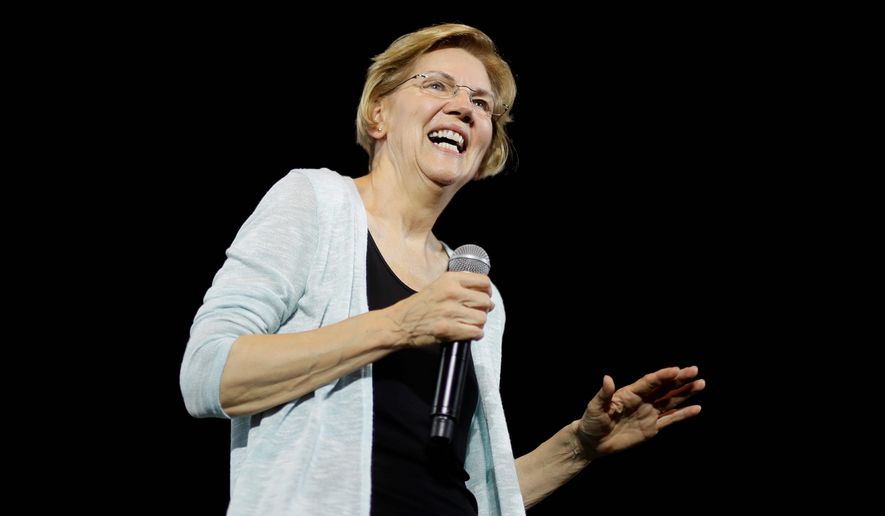Big Tech is too big, yet Americans’ access to their internet services are too constrained — so it’s time for a government takeover, Sen. Elizabeth Warren says.
The Massachusetts Democrat is leading the charge for a regulatory crackdown that would rein in the freewheeling nature of the internet. She wants tech giants such as Amazon, Google and Facebook cut down to size the same way Ma Bell was nearly 40 years ago.
Her fellow 2020 Democratic presidential hopefuls, including former Vice President Joseph R. Biden and New Age guru Marianne Williamson, have their own plans. They say companies such as Facebook have turned themselves into necessities and the government must respond.
“We have to recognize it for what it is: It is essentially a utility that has gone unregulated. And as far as I’m concerned, that’s got to stop,” said Sen. Kamala D. Harris, California Democrat and presidential contender.
Even as the candidates talk of new rules for the information superhighway, they want the government to become the granddaddy of internet service providers by building federally run high-speed internet in rural and other underserved communities.
It is the tech equivalent of “Medicare for All” government-run health care. One candidate, Pete Buttigieg, mayor of South Bend, Indiana, even dubbed his plan “Internet for All.”
These candidates backed away from a proposed takeover of health care recently after voters balked at potential impacts on services they enjoy, such as the freedom to pick their doctors and insurance plans.
Voters are not convinced that it’s time to mess with their favorite tech companies.
A majority say it is unnecessary to break up Amazon, Apple and Google to stop them from becoming too big and powerful, according to a survey this summer by RealClear Opinion Research.
Americans told the pollsters that it is unnecessary to break up Amazon (55% to 30%), Apple (55% to 28%), Google (53% to 32%) or Facebook (48% to 38%).
The survey showed no significant differences in opinion by party affiliation. Democrats and Republicans were equally as likely to say splitting up Big Tech is unnecessary.
When Ms. Warren first floated her breakup plan in April, an NBC News/Wall Street Journal poll found that 50% of voters opposed it and 47% supported it.
A larger majority of 68% told the pollsters that those types of decisions should be left to the free market instead of the government.
Under Ms. Warren’s plan, Facebook would be forced to spin off Instagram and WhatsApp, Amazon would have to jettison Whole Foods grocery stores and Zappos shoe stores from its retail empire, and Google would shed Waze maps, Nest smart home systems and the online advertising platform DoubleClick.
Ms. Warren insisted that nothing consumers like about the companies would change.
“Here’s what will change,” she said. “Small businesses would have a fair shot to sell their products on Amazon without the fear of Amazon pushing them out of business. Google couldn’t smother competitors by demoting their products on Google Search. Facebook would face real pressure from Instagram and WhatsApp to improve the user experience and protect our privacy. Tech entrepreneurs would have a fighting chance to compete against the tech giants.”
The companies in the candidates’ crosshairs staunchly oppose divvying up their businesses, as do technology enthusiasts.
“Breaking up large internet companies just because they are large won’t help consumers. It will hurt them by reducing convenience, reducing the quality of service and innovation, and in some cases leading to the introduction of priced services,” said Rob Atkinson, president of Information Technology and Innovation Foundation, a science and technology policy think tank.
Amazon officials criticized Ms. Warren for accusing the company of stealing business ideas from people using its platform, an allegation she regularly makes from the stump.
“Sellers aren’t being ’knocked out’ — they’re seeing record sales every year,” Amazon tweeted.
Breakup plans for Big Tech won support from the Electronic Frontier Foundation, an advocate for civil liberties on the internet.
“It is quite possible that industry is opposing discussions of structural separation policies, which have a long history in antitrust law because they might be the most effective solution,” the group said in a blog post. “An extraordinarily valuable benefit of the internet is how it has lowered the barriers to participation in commerce, politics and other social activities that historically were often reserved to the powerful few.”
It’s not just Democratic candidates who want a piece of Big Tech. Congress is eyeing tougher regulations. The Justice Department and a bipartisan group of state attorneys general are exploring antitrust lawsuits.
Republican lawmakers such as Sen. Ted Cruz of Texas and Sen. Josh Hawley of Missouri have proposed tighter regulations for tech giants, though their ideas stop far short of slicing and dicing the businesses.
Democratic strategist Zach Friend called it a “low-risk proposition” to go after tech companies because they do not have a direct constituency like most other sectors.
“Even though there are real and valid concerns about privacy that should be addressed, there is also a reality that people’s daily lives are intertwined with tech and most appreciate what tech does for them,” he said. “From health care improvements to research capabilities to the ability to communicate with family, it seems that people either view it approvingly or at least as a flawed necessity.”
• S.A. Miller can be reached at smiller@washingtontimes.com.




Please read our comment policy before commenting.